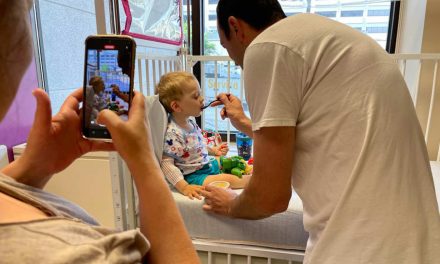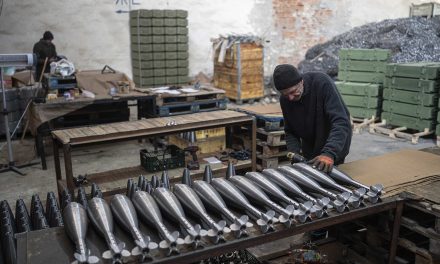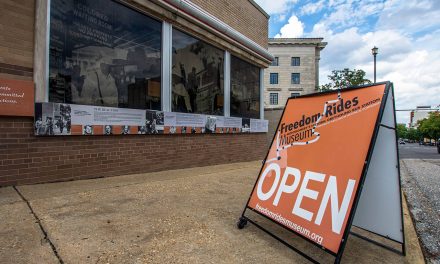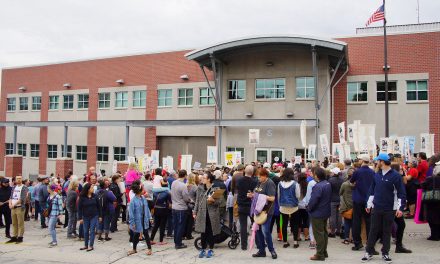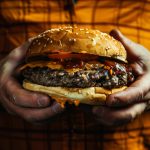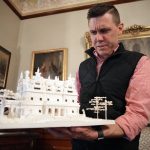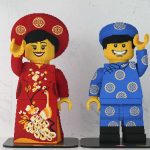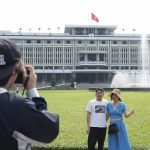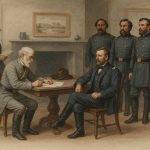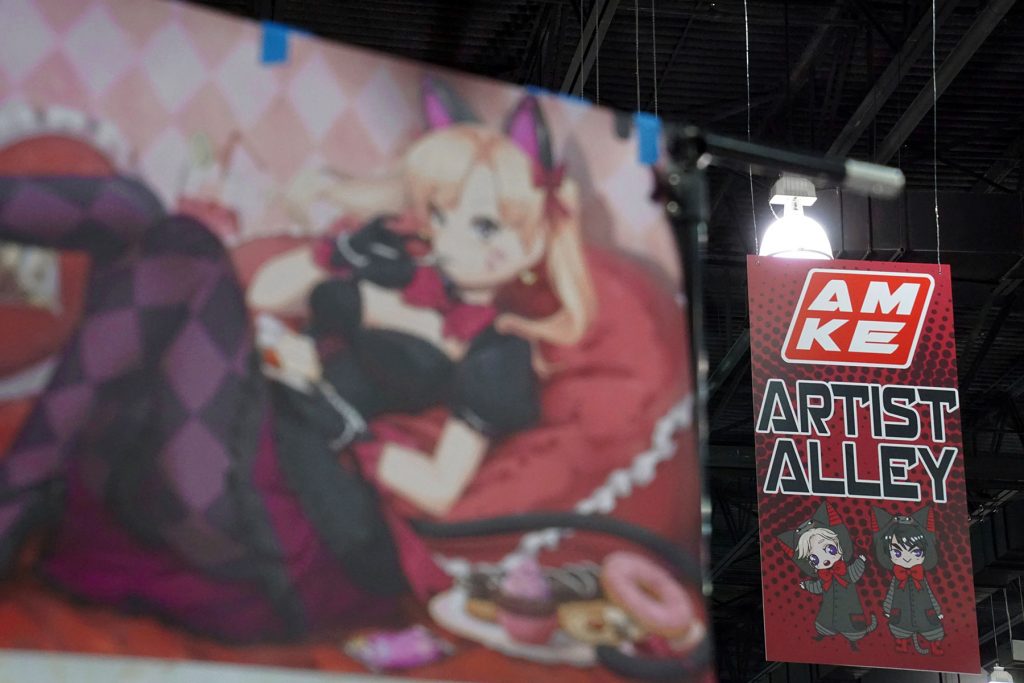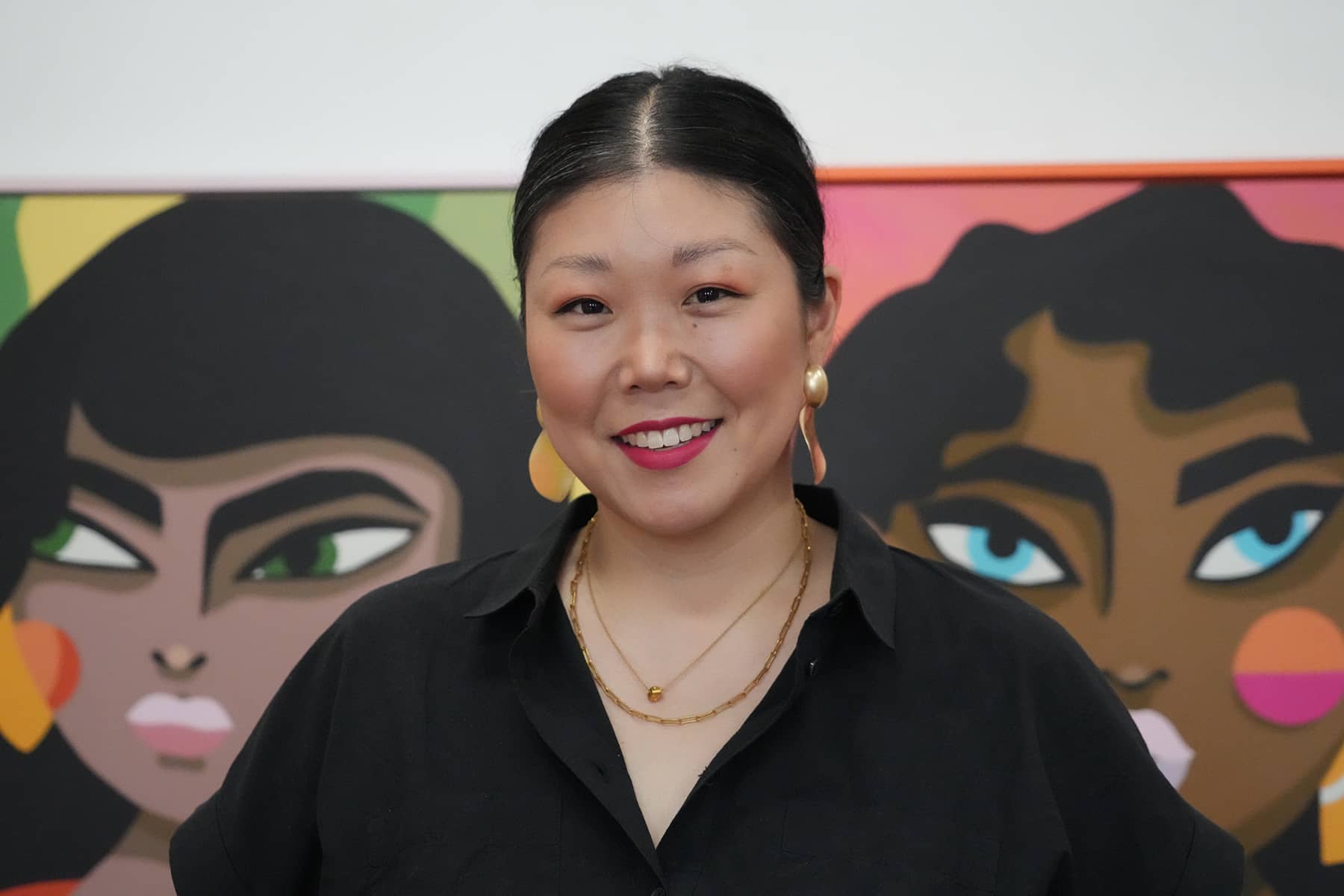
In an environment where identity is closely linked to individual heritage, the journey of a Korean adoptee growing up in Wisconsin can involve adapting to challenges like community belonging, social connection, and self-acceptance. For Emma Daisy Hyun Ah Gertel, it meant navigating a cultural dissonance between two very different worlds.
Adopted from South Korea along with her older brother in April 1986, Gertel was too young to retain any memories of her homeland.
“I don’t have any memories of where I was born. I arrived here when I was 13 months old. My brother was three at the time,” said Gertel. “I have memories from photos that exist, even from the day of our adoption. But a lot of the early memories I have, I think they are all from those photographs or stories I was told, not from my own brain.”
Gertel said that her brother did not clearly remember much from when he was a baby in South Korea, but he was speaking Korean when he arrived in America. That ability was lost very quickly.
“I think my birth mother was very wise in how she gave us up. She surrendered us fully at the time, so there was no waiting period. Normally when children are surrendered, or surrendered anonymously, they have to be kept in foster care for a certain amount of time before they could be adopted,” said Gertel. “We were adopted immediately. My adoptive parents wanted two children, and felt very strongly about the opportunity to keep siblings together in their experience.”
Gertel’s adoptive mother was a psychotherapist, with both adoptive parents having long careers in social work. Her adoptive mother’s inability to have children, combined with wanted siblings – specifically ones who would not be separated, fit the situation of Gertel and her brother.
That unique sibling bond and their shared experiences would also be the cornerstone of their relationship with new parents in a new country.
The siblings grew up in Waukesha, a predominantly White suburban community. It was there that the complexities of Gertel’s identity began to surface. But for many years, she did not consciously recognize that her appearance did not match her peers.
“I didn’t think about looking different at all when I was little. Because I could see my brother who looked like me, and my parents – they were so totally my parents. I know adopted kids have various experiences with their families, but I never felt like my parents weren’t my real parents,” said Gertel. “My mom always used to joke in public like, ‘this is my daughter, can’t you tell? Don’t we look so much alike?’ And she always said it because she was so proud of me and she wanted people to know.”
It was not until her teen years, as Gertel became more self-aware, that she realized her physical appearance set her apart. Until then she had always seen herself as being White too.
“At some point, that flipped and when I looked in the mirror I realized I was Asian. All of a sudden I was very aware of being different,” said Gertel. “Every young person goes through that period of being self-conscious about yourself, so I don’t think my experience was any different. But being Korean in a White community, it was easier to see that I looked different. So that’s when I really tried to assimilate and blend in with everyone else.”
Just like many minority youth in predominantly White communities, Gertel faced moments of racism. But she said her experiences never left her discouraged, even if her feelings were stung on occasions.
“I took gymnastics when I was little but I didn’t stay with it for very long, because there was a boy in that class who would ask me why my face was flat,” said Gertel. “At the time, I didn’t understand why it hurt my feelings, but I was aware it didn’t feel good. So if gymnastics made me feel bad I didn’t want to go back. And I never did.”
The casual nature of her experiences with racism continued throughout her life, manifesting in playground taunts and more insidious forms as she grew older.
“The most memorable things from growing up happened on the playground. Other kids calling me names or doing the slanty eyes thing with their fingers to their faces,” said Gertel. “Then in my high school and college years, there was kind of an odd contrast. In the everyday world, guys would yell nasty things at me from their car to chase me away. While in the dating world, there were a lot of guys who chased after me because they had fetishes for Asian women.”
Gertel said the sense of being different had always been a part of her identity, something inescapable. While she had encountered occasions of name-calling and minor slights, Gertel never felt that she was treated poorly or unfairly in a broader context.
“Maybe I’ve just been lucky, but I don’t think I’ve ever really and truly felt or experienced racism in a way that has affected me in a negative way, or had an impact on my life,” said Gertel.
Despite her social challenges, Gertel praised the efforts made by her adoptive parents to keep her connected to her Korean heritage. They took Gertel and her brother to Asian grocery stores, bought kimchi and other Korean foods, and even participated in cultural events like Korea Camp, where families who had adopted Korean children would gather. Yet there were still unavoidable feelings of disconnection.
“I enjoyed that exposure, but I never identified with any of those communities. That’s the part of it when you’re adopted. You’re not raised with the culture of your birth. You’re not raised with a family, or extended family, or any of those influences that keep you connected,” said Gertel.
That disconnection had an influence on Gertel’s formative years into her adult life. She described it as living in an “in-between space” and finding where she could exist as herself.
“I identify strongly with my Midwestern upbringing and culture, which shaped much of who I am. But there are aspects of Korean culture that I feel just live inside me, they are inherently ingrained in my DNA,” said Gertel. “I think of creativity as one of those deeply rooted traits. The place and people I come from are incredibly creative, and it resonates strongly with me.”
She said that people have often told her that she should visit South Korea, that she would love it there because of the incredible level of design and art that was everywhere. Gertel has spent time reflecting on the concepts behind her connections, whether it was the influence of nature versus nurture, or the blend of environment and genetics.
“I think those connections do exist in people. It’s fascinating to consider where these traits come from and how they shape us across generations,” said Gertel. “There’s Korean influence in my art because, for whatever reason, I’m drawn to the styles. But beyond that, it was really an exploration of where I come from, of my origins, of the culture I did not grow up with.”
Gertel’s artistic work is an interpretation of Korean elements through the lens of her American upbringing, creating a unique blend that reflects her dual identity. The result is an example of her “in-between” existence.
“I haven’t been to Korea since I was born. My brother has – he even visiting our birthplace, but he’s not interested in searching for our birth parents, particularly our birth mother,” said Gertel.
Growing up with a biological sibling is unique in the context of adoption. Gertel shared an experience that, while unspoken at the time, was profoundly different from what many adoptees go through. Having her brother meant she always had someone from where she came from.
“Although I couldn’t have articulated it back then, it deeply influenced our experience, and I never felt like something was absent,” said Gertel. “Unlike many adoptees, I never felt the urge to search for something missing from my life. I think a big part of that is because we were lucky to have parents who didn’t try to indoctrinate us into any specific religion or culture. They simply guided us as any loving parents would. Growing up with my brother also contributed to that sense of completeness.”
Gertel said that she did not feel a strong compulsion to search for her Korean family. She did wonder about them, and at times was curious if her mother was still alive, what her life was like, did she have any half-siblings.
“But that curiosity doesn’t extend beyond a general interest. I do not feel any need to make a search, plus I would have to discuss it with my brother. If I ever found her, then he would be drawn into it, whether he wanted to or not,” said Gertel. “So, I think that would be difficult to push him into something he wasn’t ready for.”
The journey of self-acceptance gave Gertel an unexpected level of empowerment, starting with self-love. It translated into many positive things for her life, including feelings of fulfillment and contentment.
“A huge part of it was when I stopped feeling like I needed to fit into this world that existed around me,” said Gertel added. “I think just accepting myself became my superpower. All of a sudden I was like, ‘this is a great part of who I am,’ and I’m going to celebrate that for myself.
- Exploring Korea: Stories from Milwaukee to the DMZ and across a divided peninsula
- A pawn of history: How the Great Power struggle to control Korea set the stage for its civil war
- Names for Korea: The evolution of English words used for its identity from Gojoseon to Daehan Minguk
- SeonJoo So Oh: Living her dream of creating a "folded paper" bridge between Milwaukee and Korean culture
- A Cultural Bridge: Why Milwaukee needs to invest in a Museum that celebrates Korean art and history
- Korean diplomat joins Milwaukee's Korean American community in celebration of 79th Liberation Day
- John T. Chisholm: Standing guard along the volatile Korean DMZ at the end of the Cold War
- Most Dangerous Game: The golf course where U.S. soldiers play surrounded by North Korean snipers
- Triumph and Tragedy: How the 1988 Seoul Olympics became a battleground for Cold War politics
- Dan Odya: The challenges of serving at the Korean Demilitarized Zone during the Vietnam War
- The Korean Demilitarized Zone: A border between peace and war that also cuts across hearts and history
- The Korean DMZ Conflict: A forgotten "Second Chapter" of America's "Forgotten War"
- Dick Cavalco: A life shaped by service but also silence for 65 years about the Korean War
- Overshadowed by conflict: Why the Korean War still struggles for recognition and remembrance
- Wisconsin's Korean War Memorial stands as a timeless tribute to a generation of "forgotten" veterans
- Glenn Dohrmann: The extraordinary journey from an orphaned farm boy to a highly decorated hero
- The fight for Hill 266: Glenn Dohrmann recalls one of the Korean War's most fierce battles
- Frozen in time: Rare photos from a side of the Korean War that most families in Milwaukee never saw
- Jessica Boling: The emotional journey from an American adoption to reclaiming her Korean identity
- A deportation story: When South Korea was forced to confront its adoption industry's history of abuse
- South Korea faces severe population decline amid growing burdens on marriage and parenthood
- Emma Daisy Gertel: Why finding comfort with the "in-between space" as a Korean adoptee is a superpower
- The Soul of Seoul: A photographic look at the dynamic streets and urban layers of a megacity
- The Creation of Hangul: A linguistic masterpiece designed by King Sejong to increase Korean literacy
- Rick Wood: Veteran Milwaukee photojournalist reflects on his rare trip to reclusive North Korea
- Dynastic Rule: Personality cult of Kim Jong Un expands as North Koreans wear his pins to show total loyalty
- South Korea formalizes nuclear deterrent strategy with U.S. as North Korea aims to boost atomic arsenal
- Tea with Jin: A rare conversation with a North Korean defector living a happier life in Seoul
- Journalism and Statecraft: Why it is complicated for foreign press to interview a North Korean defector
- Inside North Korea’s Isolation: A decade of images show rare views of life around Pyongyang
- Karyn Althoff Roelke: How Honor Flights remind Korean War veterans that they are not forgotten
- Letters from North Korea: How Milwaukee County Historical Society preserves stories from war veterans
- A Cold War Secret: Graves discovered of Russian pilots who flew MiG jets for North Korea during Korean War
- Heechang Kang: How a Korean American pastor balances tradition and integration at church
- Faith and Heritage: A Pew Research Center's perspective on Korean American Christians in Milwaukee
- Landmark legal verdict by South Korea's top court opens the door to some rights for same-sex couples
- Kenny Yoo: How the adversities of dyslexia and the war in Afghanistan fueled his success as a photojournalist
- Walking between two worlds: The complex dynamics of code-switching among Korean Americans
- A look back at Kamala Harris in South Korea as U.S. looks ahead to more provocations by North Korea
- Jason S. Yi: Feeling at peace with the duality of being both an American and a Korean in Milwaukee
- The Zainichi experience: Second season of “Pachinko” examines the hardships of ethnic Koreans in Japan
- Shadows of History: South Korea's lingering struggle for justice over "Comfort Women"
- Christopher Michael Doll: An unexpected life in South Korea and its cross-cultural intersections
- Korea in 1895: How UW-Milwaukee's AGSL protects the historic treasures of Kim Jeong-ho and George C. Foulk
- "Ink. Brush. Paper." Exhibit: Korean Sumukhwa art highlights women’s empowerment in Milwaukee
- Christopher Wing: The cultural bonds between Milwaukee and Changwon built by brewing beer
- Halloween Crowd Crush: A solemn remembrance of the Itaewon tragedy after two years of mourning
- Forgotten Victims: How panic and paranoia led to a massacre of refugees at the No Gun Ri Bridge
- Kyoung Ae Cho: How embracing Korean heritage and uniting cultures started with her own name
- Complexities of Identity: When being from North Korea does not mean being North Korean
- A fragile peace: Tensions simmer at DMZ as North Korean soldiers cross into the South multiple times
- Byung-Il Choi: A lifelong dedication to medicine began with the kindness of U.S. soldiers to a child of war
- Restoring Harmony: South Korea's long search to reclaim its identity from Japanese occupation
- Sado gold mine gains UNESCO status after Tokyo pledges to exhibit WWII trauma of Korean laborers
- The Heartbeat of K-Pop: How Tina Melk's passion for Korean music inspired a utopia for others to share
- K-pop Revolution: The Korean cultural phenomenon that captivated a growing audience in Milwaukee
- Artifacts from BTS and LE SSERAFIM featured at Grammy Museum exhibit put K-pop fashion in the spotlight
- Hyunjoo Han: The unconventional path from a Korean village to Milwaukee’s multicultural landscape
- The Battle of Restraint: How nuclear weapons almost redefined warfare on the Korean peninsula
- Rejection of peace: Why North Korea's increasing hostility to the South was inevitable
- WonWoo Chung: Navigating life, faith, and identity between cultures in Milwaukee and Seoul
- Korean Landmarks: A visual tour of heritage sites from the Silla and Joseon Dynasties
- South Korea’s Digital Nomad Visa offers a global gateway for Milwaukee’s young professionals
- Forgotten Gando: Why the autonomous Korean territory within China remains a footnote in history
- A game of maps: How China prepared to steal Korean history to prevent reunification
- From Taiwan to Korea: When Mao Zedong shifted China’s priority amid Soviet and American pressures
- Hoyoon Min: Putting his future on hold in Milwaukee to serve in his homeland's military
- A long journey home: Robert P. Raess laid to rest in Wisconsin after being MIA in Korean War for 70 years
- Existential threats: A cost of living in Seoul comes with being in range of North Korea's artillery
- Jinseon Kim: A Seoulite's creative adventure recording the city’s legacy and allure through art
- A subway journey: Exploring Euljiro in illustrations and by foot on Line 2 with artist Jinseon Kim
- Seoul Searching: Revisiting the first film to explore the experiences of Korean adoptees and diaspora























